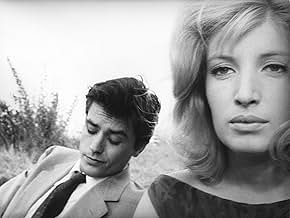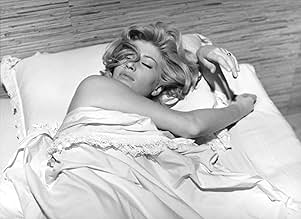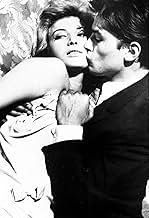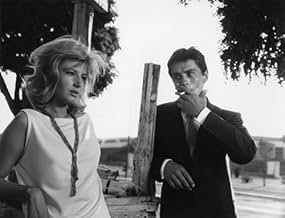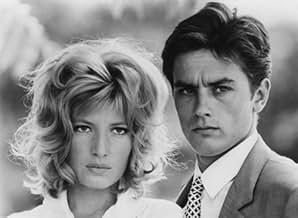NOTE IMDb
7,7/10
24 k
MA NOTE
Une jeune femme rencontre un jeune homme, mais leur histoire d'amour est condamnée à cause des tendances matérialistes du jeune homme.Une jeune femme rencontre un jeune homme, mais leur histoire d'amour est condamnée à cause des tendances matérialistes du jeune homme.Une jeune femme rencontre un jeune homme, mais leur histoire d'amour est condamnée à cause des tendances matérialistes du jeune homme.
- Réalisation
- Scénario
- Casting principal
- Récompenses
- 1 victoire et 5 nominations au total
Cyrus Elias
- Intoxicated Man
- (non crédité)
Alba Maiolini
- Woman at the Stock Market
- (non crédité)
Maria Tedeschi
- Woman with Glasses at the Stock Market
- (non crédité)
Avis à la une
L'Eclisse (1962) is a profoundly artistic, wonderfully crafted modern Italian film, in which the audience is permitted to draw their own conclusions about what they are seeing on the screen.
Unlike most directors, who construct their films in very specific, traditional ways to tell stories they wish to convey, in L'Eclisse the director Michelangelo Antonioni paints pictures which mean different things to different people. It's an open-ended story and the audience is allowed and actually encouraged to come up with their own theories about the main plot and sub-plots, the overall themes, and the characters' motivations and personalities. None of them are carved in stone. You yourself can travel to a very special, unique place by watching L'Eclisse, and it can be a very different journey than someone else's.
What do the white lines mean to you? They show up several times in compositional frames in the film: on the street, on the runway when the plane lands, outside a church, and in more abstract ways in signposts, in clothing, in architecture. Is an actual eclipse taking place when darkness descends and the street light suddenly goes on? or has nighttime simply fallen and we're left with a sense of desolation and obliteration of the modern city? has the city been hit by a nuclear bomb? The mushroom water tower: does it just signify the nuclear age, or is it a real omen for the future of mankind? Is it not also a phallic symbol, showcasing the director's idea that the stockbroker character is primarily interested in towering conquests, and that sexuality is an underlying motivation of the main female character's psyche, even though she also seems afraid of intimacy and commitment? The man riding the horse and buggy and the nursemaid pushing the baby buggy: do these things just mark the passage of time? or do they have a deeper meaning that represents the old world, a world that is quickly disappearing from the modern landscape? Is the final scene between the couple the end of their relationship, or are they about to become more serious? Questions like these can be answered in different ways, depending on your own perspective.
This was a novel approach to film-making in 1962, and actually it's also still novel today too! How many films dare to resemble L'Eclisse in the 21st century? Today films are too formulaic and rarely is the same creativity expressed that Michelangelo Antonioni achieved so sublimely in his film. If I was a filmmaker this would be the kind of film I would love to make, full of symbolism and repressed emotions.
The cinematography is exquisite in this film. The new Criterion double disc set did a fantastic job with the print and the extras. My suggestion would be to watch the film without commentary and then immediately afterward watch it again with the commentary on. As he talks you will find yourself noticing things you missed the first time around, and that the commentator is missing too! For instance, notice how in the scene when the ladies are chasing the dogs who have escaped the apartment, that Vittoria approaches two dogs, a white and a black one, and it's the black dog who gets up and dances and charms her, an analogy to the previous scene, in which Vittoria had put on black-face and did an African dance in her racist friend's apartment. The white dog blithely walks away, representing the stifling racist views of her friend Marta, and the black dog shows joy of movement and a fun nature, like Vittoria. The commentator completely misses this message.
Acting is superb by all three leads, Monica Vitti, with her finely chiseled face and wild blonde hair, Alain Delon, who conveys emotions easily with just the flick of an eyebrow, and Francisco Rabal, classically handsome and intense. Also of note is the actress who plays Vittoria's mother, Lila Brignone, who does a good job depicting the emotional distance the character feels from the estranged daughter, which in turn conveys to the audience one of the primary reasons Vittoria is afraid of intimacy: she never had a demonstrative relationship with her mother.
If you're a fan of Italian cinema, don't miss L'Eclisse. It's a special film which will stay with you long after you've seen it.
10 out of 10.
Unlike most directors, who construct their films in very specific, traditional ways to tell stories they wish to convey, in L'Eclisse the director Michelangelo Antonioni paints pictures which mean different things to different people. It's an open-ended story and the audience is allowed and actually encouraged to come up with their own theories about the main plot and sub-plots, the overall themes, and the characters' motivations and personalities. None of them are carved in stone. You yourself can travel to a very special, unique place by watching L'Eclisse, and it can be a very different journey than someone else's.
What do the white lines mean to you? They show up several times in compositional frames in the film: on the street, on the runway when the plane lands, outside a church, and in more abstract ways in signposts, in clothing, in architecture. Is an actual eclipse taking place when darkness descends and the street light suddenly goes on? or has nighttime simply fallen and we're left with a sense of desolation and obliteration of the modern city? has the city been hit by a nuclear bomb? The mushroom water tower: does it just signify the nuclear age, or is it a real omen for the future of mankind? Is it not also a phallic symbol, showcasing the director's idea that the stockbroker character is primarily interested in towering conquests, and that sexuality is an underlying motivation of the main female character's psyche, even though she also seems afraid of intimacy and commitment? The man riding the horse and buggy and the nursemaid pushing the baby buggy: do these things just mark the passage of time? or do they have a deeper meaning that represents the old world, a world that is quickly disappearing from the modern landscape? Is the final scene between the couple the end of their relationship, or are they about to become more serious? Questions like these can be answered in different ways, depending on your own perspective.
This was a novel approach to film-making in 1962, and actually it's also still novel today too! How many films dare to resemble L'Eclisse in the 21st century? Today films are too formulaic and rarely is the same creativity expressed that Michelangelo Antonioni achieved so sublimely in his film. If I was a filmmaker this would be the kind of film I would love to make, full of symbolism and repressed emotions.
The cinematography is exquisite in this film. The new Criterion double disc set did a fantastic job with the print and the extras. My suggestion would be to watch the film without commentary and then immediately afterward watch it again with the commentary on. As he talks you will find yourself noticing things you missed the first time around, and that the commentator is missing too! For instance, notice how in the scene when the ladies are chasing the dogs who have escaped the apartment, that Vittoria approaches two dogs, a white and a black one, and it's the black dog who gets up and dances and charms her, an analogy to the previous scene, in which Vittoria had put on black-face and did an African dance in her racist friend's apartment. The white dog blithely walks away, representing the stifling racist views of her friend Marta, and the black dog shows joy of movement and a fun nature, like Vittoria. The commentator completely misses this message.
Acting is superb by all three leads, Monica Vitti, with her finely chiseled face and wild blonde hair, Alain Delon, who conveys emotions easily with just the flick of an eyebrow, and Francisco Rabal, classically handsome and intense. Also of note is the actress who plays Vittoria's mother, Lila Brignone, who does a good job depicting the emotional distance the character feels from the estranged daughter, which in turn conveys to the audience one of the primary reasons Vittoria is afraid of intimacy: she never had a demonstrative relationship with her mother.
If you're a fan of Italian cinema, don't miss L'Eclisse. It's a special film which will stay with you long after you've seen it.
10 out of 10.
Antonioni's 'L'Eclisse' depicts the emptiness and and meaningless of life in the post-Second World War world under the shadow of the nuclear threat. This is represented by the mushroom shaped water-tower looming outside the window in the film's early sequences, and is referred to again in newspaper headlines towards the end of the film. This film was made in 1962, a year after the Berlin crisis, and in the year of the Cuba crisis when we came very close to nuclear war between the USA and the USSR.
The film also depicts the greed of capitalism, as shown in the mad, chaotic scenes in the Rome Stock Exchange and the obsessive gambling of the mother character.
The location, with distant shots of Benito Mussolini's EUR buildings on the outskirts of Rome, also suggest a meaningless, empty, soulless Brave New World all overshadowed by the nuclear threat, where people suffer loneliness and depression and feel unable to make long-term commitments.
The film also depicts the greed of capitalism, as shown in the mad, chaotic scenes in the Rome Stock Exchange and the obsessive gambling of the mother character.
The location, with distant shots of Benito Mussolini's EUR buildings on the outskirts of Rome, also suggest a meaningless, empty, soulless Brave New World all overshadowed by the nuclear threat, where people suffer loneliness and depression and feel unable to make long-term commitments.
Smart and moody, this film is not only about emotional Eclipse, it is about the eclipse of the old society as it changes, and also about how architectural changes eclipse older style, and more importantly, nature. There are really smart and insightful comments here on changing racial attitudes, and the disparities between rich, poor, and the people who don't mind cannibalizing the disenfranchised. All this commentary done with the subtlety of the slowing growing suburbs that our leading lady lives in.
Monica Vitti plays our "everywoman" who is our window into the Director's mind, but also herself a mere dot on the landscape. Early on, we see her throw away exactly what she seems to be looking for, only to pursue it in exactly the wrong place/person.
The film has a look of a sci-fi horror movie, but the horror here is emotional desolation, the destruction of nature/natural-ness, and the looming threat of nuclear war. This film, so cleanly represents the era when "duck and cover" was not only a physical act, it was an emotional state.
If you don't like film as art, you will be completely lost by the architectural city-scape ending montage, and the lack of traditional film closure. This is not a light evening of movie entertainment, but it is film making at it's non-verbal, eloquent best. Captivating, thought provoking, and meaty.
Monica Vitti plays our "everywoman" who is our window into the Director's mind, but also herself a mere dot on the landscape. Early on, we see her throw away exactly what she seems to be looking for, only to pursue it in exactly the wrong place/person.
The film has a look of a sci-fi horror movie, but the horror here is emotional desolation, the destruction of nature/natural-ness, and the looming threat of nuclear war. This film, so cleanly represents the era when "duck and cover" was not only a physical act, it was an emotional state.
If you don't like film as art, you will be completely lost by the architectural city-scape ending montage, and the lack of traditional film closure. This is not a light evening of movie entertainment, but it is film making at it's non-verbal, eloquent best. Captivating, thought provoking, and meaty.
The Eclipse denotes Michelangelo Antonioni 's flawless taste,and his powerful,virile instinct for strong compositions;this elegant and suave movie is one of the cinema's best pieces of poetry (I must also confess that I prefer this early,younger,"black and white" and peninsular Michelangelo Antonioni;he was 50 years when he made L'ECLISSE).Before he approached the '60s counterculture,Antonioni made a few strong movies not only for the intellectuals but also about intellectuals.
This one is an incredibly rich movie,a movie about many things:about solitude,financial pawns,a woman's indefinite aspirations,the vibrating city beauty,and the heart's resilience,the woman soul's density,the urban aesthetic;and also about:greed,people that search gropingly .Little wheels in the gearing of the stock exchange;the stock exchange's crushing machine.Antonioni is caustic and sober.His theme,the human monad,is inexhaustible.The naturalness,the charm,the intensity,the integrity,the width of this film must be mentioned.Antonioni proved that,for his cinema,experiments are always ways and means,while the most intense poetry is the aim.(Each great director is an experimenter;all great directors are experimenters,only to be better poets.)
Antonioni is one of the three directors who,according to Averty,never made a bad movie (and Antonioni's creation was,for almost two decades, quite abundant;it is only after Blowup (1966) that he went slow,making some seven movies in so many decades).His movies don't have a "sockdolager",that's part of what makes them so good and endearing.Experimenting in countless ways,Antonioni never forgot to be a poet,and never failed.His aesthetic aim has a side of ingenuity and directness that enchants in an unfailing way.
And what is Antonioni's poetry?It is this compact texture,this density of the people and of the life,the striking immediacy.It is amazing also how Antonioni put all of himself in this beautiful movie,The Eclipse.
Like a few others,The Eclipse is one of the movies that give us the taste of what cinema can be.
This one is an incredibly rich movie,a movie about many things:about solitude,financial pawns,a woman's indefinite aspirations,the vibrating city beauty,and the heart's resilience,the woman soul's density,the urban aesthetic;and also about:greed,people that search gropingly .Little wheels in the gearing of the stock exchange;the stock exchange's crushing machine.Antonioni is caustic and sober.His theme,the human monad,is inexhaustible.The naturalness,the charm,the intensity,the integrity,the width of this film must be mentioned.Antonioni proved that,for his cinema,experiments are always ways and means,while the most intense poetry is the aim.(Each great director is an experimenter;all great directors are experimenters,only to be better poets.)
Antonioni is one of the three directors who,according to Averty,never made a bad movie (and Antonioni's creation was,for almost two decades, quite abundant;it is only after Blowup (1966) that he went slow,making some seven movies in so many decades).His movies don't have a "sockdolager",that's part of what makes them so good and endearing.Experimenting in countless ways,Antonioni never forgot to be a poet,and never failed.His aesthetic aim has a side of ingenuity and directness that enchants in an unfailing way.
And what is Antonioni's poetry?It is this compact texture,this density of the people and of the life,the striking immediacy.It is amazing also how Antonioni put all of himself in this beautiful movie,The Eclipse.
Like a few others,The Eclipse is one of the movies that give us the taste of what cinema can be.
It only takes a few films to become familiar with the methodic ways of Michelangelo Antonioni. Themes of alienation, disconnection, romance without the romance and dealing with an ambiguous existential way of life. It's fascinating but challenging. I came into L'Eclisse wanting to love it because I love L'Avventura and Blowup but deliberately hard to connect to. We're thrown into a vague but disheartening scenario with depressed characters and just have to follow down that road. It has rich cinematography that has beautiful composition, but an gut- sinking emptiness. It's almost too precise and too self-aware. But that's the beauty of the film, its aesthetic is not supposed to be pleasing, even though artistically it should be. In fact, it's painful. Painful to watch the busiest life of the film being at the stock market while the rest of nature is desolate yet so picturesque. Machines and technology are prominent throughout the film and often physically get in the way of human relationships. The film is a profound and quietly poignant statement on human desires and insecurities, if a little held back by a touch of pretence and too cold for its own good.
8/10
8/10
Alain Delon's Top 10 Films, Ranked
Alain Delon's Top 10 Films, Ranked
To celebrate the life and career of Alain Delon, the actor often credited with starring in some of the greatest European films of the 1960s and '70s, we rounded up his top 10 movies, ranked by IMDb fan ratings.
Le saviez-vous
- AnecdotesThe Roman stock market scenes were filmed on Sundays when the market was closed. Real brokers were drafted to make it more convincing.
- Gaffes(at around 1h 28 mins) Vittoria and Piero get wet from a sprinkler. The right side of Piero's jacket is wet. A minute later when they are listening to the piano player, the back of Vittoria's blouse is still wet, but Piero's jacket is dry.
- Versions alternativesWest German theatrical version was cut by approx. three minutes.
- ConnexionsEdited into Dolce Vitti (2014)
Meilleurs choix
Connectez-vous pour évaluer et suivre la liste de favoris afin de recevoir des recommandations personnalisées
- How long is L'Eclisse?Alimenté par Alexa
Détails
Box-office
- Montant brut mondial
- 5 947 $US
- Durée2 heures 6 minutes
- Couleur
- Rapport de forme
- 1.85 : 1
Contribuer à cette page
Suggérer une modification ou ajouter du contenu manquant



